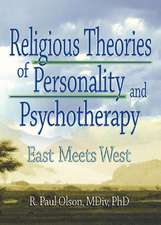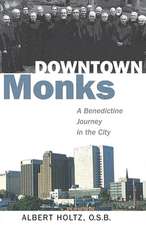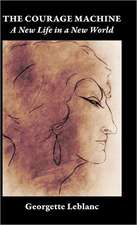Korean Shamanism: The Cultural Paradox
Autor Chongho Kimen Limba Engleză Paperback – 11 noi 2019
| Toate formatele și edițiile | Preț | Express |
|---|---|---|
| Paperback (1) | 216.99 lei 6-8 săpt. | |
| Taylor & Francis – 11 noi 2019 | 216.99 lei 6-8 săpt. | |
| Hardback (1) | 767.93 lei 6-8 săpt. | |
| Taylor & Francis – 30 noi 2017 | 767.93 lei 6-8 săpt. |
Preț: 216.99 lei
Preț vechi: 259.14 lei
-16% Nou
Puncte Express: 325
Preț estimativ în valută:
41.52€ • 43.27$ • 34.38£
41.52€ • 43.27$ • 34.38£
Carte tipărită la comandă
Livrare economică 03-17 aprilie
Preluare comenzi: 021 569.72.76
Specificații
ISBN-13: 9781138710504
ISBN-10: 1138710504
Pagini: 270
Dimensiuni: 151 x 233 mm
Greutate: 0.5 kg
Ediția:1
Editura: Taylor & Francis
Colecția Routledge
Locul publicării:Oxford, United Kingdom
ISBN-10: 1138710504
Pagini: 270
Dimensiuni: 151 x 233 mm
Greutate: 0.5 kg
Ediția:1
Editura: Taylor & Francis
Colecția Routledge
Locul publicării:Oxford, United Kingdom
Cuprins
Contents: Preface; Introduction; Shamanism in trouble; Ritual without audience; Two faces of Korean culture; A practice of cultural rebellion; Against Shamanism; National living treasure; Conclusion; Bibliography; Index.
Recenzii
'Kim's creative and original study, based on his thorough and detailed knowledge of Korean society, makes an important contribution to our understanding of why Koreans make use of shamans'. Geoffrey Samuel, University of Newcastle, Australia '... bold and challenging...' BSOAS 'The book is a good read for anybody. It is also [...] a must for anybody interested in or researching shamanism.' Journal of the Royal Asiatic Society '... an engaging and stimulating contribution to the literature on the rituals of Korean Shamans... Kim's approach is to a high degree determined by his personal background. He is a Korean native anthropologist who already has considerable fieldwork experience in medical anthropology before he engaged in the study of Korean Shamanism. This allows him to understand many cultural nuances that a foreign anthropologist would easily miss... Frequently discussing his own personal feelings and reactions to what he experiences in the style of recent self-reflexive anthropology, he valiantly attempts to grasp the reality that, as he sees it, underlies such views.' International Journal of Asian Studies 'The basic question behind the book is [...] intriguing and worthy of pursuit... This volume provides much insight into the motivations for several shamanic rituals...' Asian Folklore Studies 'Kim's book sheds needed light on a fascinating phenomenon, and is thus a valuable resource on one widely misunderstood aspect of contemporary Korean culture.' Korean Quarterly '... a fascinating study... [the] findings are penetrating and insightful... sets a new standard of excellence for Korean as well as general studies of Shamanism... Kim's work is extremely valuable as an important study of modern Korean religion and society. It is exciting to read, and his many anecdotes and stories of life in Korea area both highly informative as well as engaging.' The Journal of Asian Studies '... the book successfully integrates three areas of scholarly discourse: shamanism, Korean culture, and fieldwork... this work presents a lively discussion of the meaning of shamanism in contemporary Korean society through a personal acount of hardship in researching a controversial subject... this book would appeal to ethnographers and scholars of shamanic traditions as well as general readers interested in Asian cultures and religions.' The Journal of Contemporary Religion 'This volume is a valuable addition to any library and to the personal collection of anyone interested in shamanism or Korean culture. For non-Koreans planning to work in that culture this book will give valuable insights which could take years to know and understand otherwise. This book offers a significant contribution to the growing field of work in the anthropological study of indigenous religious beliefs.' Missiology
Descriere
Title first published in 2003. Shamanism has a contradictory position within the Korean cultural system, leading to the periodical suppression of shamanism yet also, paradoxically, ensuring its survival throughout Korean history.



























